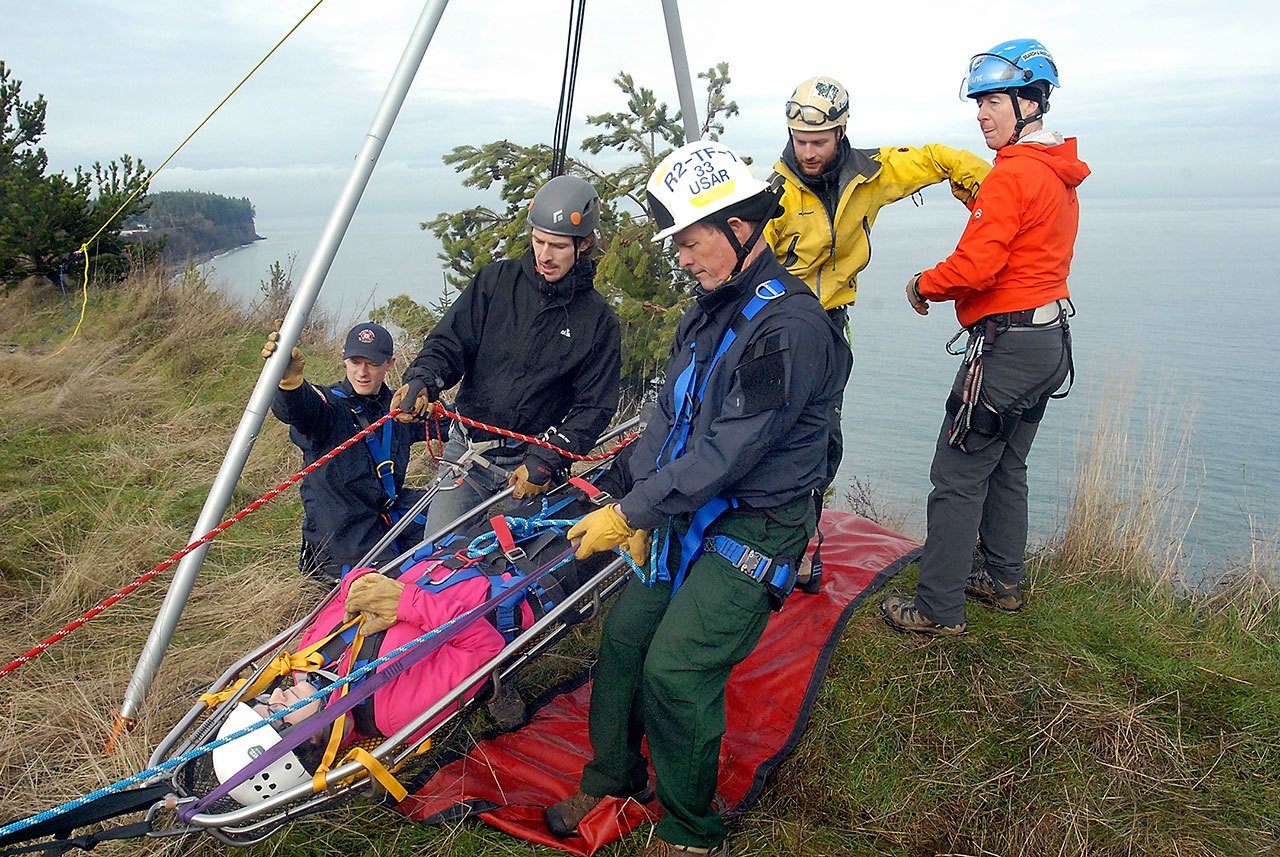PORT ANGELES — Their rescue skills aren’t needed every day, but when they are, it can be a life-or-death situation.
That’s why first responders from the Olympic Peninsula brushed up on their rope-climbing skills Wednesday by scaling a bluff on the west end of Port Angeles.
“The skill set is very perishable if you don’t utilize it,” said John Hall, rope instructor with the Clallam County Technical Rescue team.
Hall, who is also the training officer for the Clallam County Search and Rescue team, said, “It’s not a high-frequency scenario.”
First responders from Clallam County Search and Rescue, Olympic Mountain Rescue of Bremerton, Border Patrol Search, Trauma and Rescue and the Clallam County Technical Rescue Team, which is composed of firefighters from the Port Angeles Fire Department and Clallam County Fire District No. 3, all participated Wednesday.
Hall estimated the Clallam County Technical Rescue team is called out a handful of times a year for rescues across the Olympic Peninsula, typically for swift-water rescues.
On average, the teams train together about once every quarter or so, he said, with individual teams training more often.
The Technical Rescue team is trained for building collapses, trench rescues, high-angle rope rescues and swift-water rescues, Hall said.
“It doesn’t happen very often,” he said. “That’s why we have a joint team with other agencies.”
When the team does get called out, it’s not uncommon for it to work with other SAR teams from across the Olympic Peninsula, Hall said.
The Technical Rescue team helps not only in Clallam County but in Jefferson County and on other parts of the Olympic Peninsula, he said.
Part of the team provided aid when a Motel 6 in Bremerton exploded and collapsed in 2015, he said.
“A lot of times, a technical rescue scene isn’t just one team coming together to do a rescue,” Hall said. “If you’ve worked with those other team members in a training type of environment before a real rescue happens, things go much smoother.”
While most of what the teams do during a rescue is the same, there are minor differences in how they approach scenes, he said.
By coming together during training, they learn different approaches to the same type of rescue.
First responders used Wednesday as a slower training day to help teach some of the skills, instead of doing an all-out drill, Hall said.
“We have people just starting who don’t have a lot of experience, and we’ve got people who have 20 years of experience,” he said.
Crews split into three teams with the same mission.
They were lowered over a bluff and came back up from the beach with a “patient.”
For Hall, being able to use his rock-climbing skills for search and rescue is a marriage between one of his hobbies and his work.
He started with Skagit Mountain Rescue before he was with Clallam County Search and Rescue and the technical rescue team.
“I come from a climbing history,” Hall said. “This is a natural progression with my other skills, such as paramedicine.”
Others on the team share his same attitude, he said.
“Everybody here is doing it because they want to be on the team, not because they’re told to be on the team,” he said. “You’re working with highly motivated people who have a passion for it.”
________
Reporter Jesse Major can be reached at 360-452-2345, ext. 56250, or at jmajor@peninsuladailynews.com.

